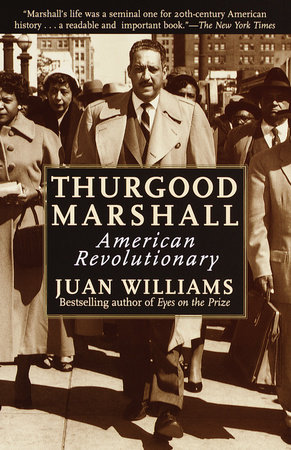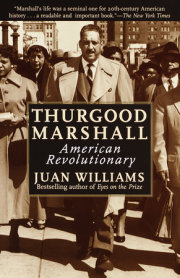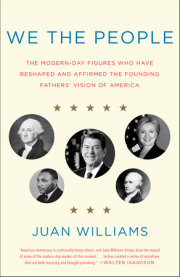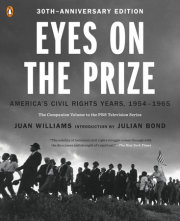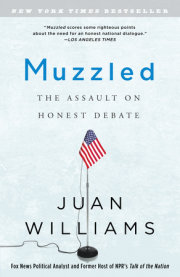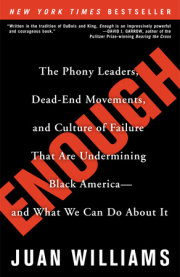Right Time, Right Man?Rumors flew that night. Supreme Court Justice Tom Clark had resigned a few hours earlier. By that Monday evening, Solicitor General Thurgood Marshall and his wife, Cissy, heard that the president was set to name Clark's replacement the very next morning. At the Marshalls' small green town house on G Street in Southwest Washington, D.C., the phone was ringing. Friends, family, and even politicians were calling to see if Thurgood had heard anything about his chances for the job. But all the Marshalls could say was that they had heard rumors.
As Marshall dressed for Clark's retirement party on that muggy Washington night of June 12, 1967, he looked at his reflection in the mirror. Years ago some of his militant critics had called him "half-white" for his straight hair, pointed nose, and light tan skin. Now, at fifty-eight, his face had grown heavy, with sagging jowls and dark bags under his eyes. His once black hair, even his mustache, was now mostly a steely gray. And he looked worried. He did have on a good dark blue suit, the uniform of a Washington power player. But the conservative suit looked old and out of place in an era of Afros and dashikis. And even the best suit might not be strong enough armor for the high-stakes political fight he was preparing for tonight. At this moment the six-foot-two-inch Marshall, who weighed well over two hundred pounds, felt powerless. He was fearful that he was about to lose his only chance to become a Supreme Court justice.
Staring in the mirror as if it were a crystal ball, Marshall could see clearly only that he would have one last chance to convince the president he was the right man. That chance would come tonight at Justice Clark's retirement party.
In his two years as solicitor general there had been constant rumors floating around the capital about Marshall being positioned by the president to become the first black man on the high court. However, with one exception, no one at the White House had ever spoken to him about the job. That exception was President Lyndon Johnson. Whenever Johnson talked about the Supreme Court in front of him, the tall, intense Texan made a point of turning to Marshall, thrusting a finger in his face, and reminding him there was no promise that he would ever have a job on the high court.
But Johnson was privately talking about putting Marshall on the Supreme Court. For a southern politician, Johnson had a strong sense of racial justice. As a skinny twenty-year-old, he had taught school to poor Hispanic children in south Texas and seen firsthand the disadvantages they faced. Now Johnson's fabled political instincts had drawn him to the idea that he would be hailed by history as the president who put the first black on the Supreme Court. The president had set the wheels in motion by making Marshall the nation's first black solicitor general. And he had confided to his wife, Lady Bird, that he wanted to appoint Marshall to the Supreme Court. But the president had been having second thoughts about Marshall. Was he really a good lawyer? And what about talk that Marshall was lazy? Was it realistic to think he could win enough votes to get by white racists in the Senate and be confirmed?
As he finished getting ready for the party, Marshall replayed all the rumors he had heard about why the president was reluctant to appoint him to the high court. Thinking about it, Marshall got grumpy, then angry. His chance to be in the history books as the first black man on the Supreme Court was fading, and he felt abandoned. The word around the capital was that the nomination would be announced tomorrow. Marshall had heard nothing from the White House.
Copyright © 2000 by Juan Williams. All rights reserved. No part of this excerpt may be reproduced or reprinted without permission in writing from the publisher.

